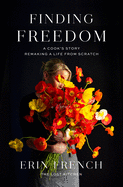
Erin French grew up in rural Maine, in the outdoors and in her father's diner, where she began helping out in the kitchen at age 12. After a few years at college, she returned home to Maine, and faced challenges including young single motherhood; a difficult marriage and more difficult divorce; opening and then losing her first small restaurant; addiction and recovery. Eventually French moved back to her hometown of Freedom, where she would start again with her wildly successful The Lost Kitchen. These travels, pitfalls and victories she recounts in Finding Freedom: A Cook's Story; Remaking a Life from Scratch. Renovation and redemption--of spaces and of herself--are central to her story.
This memoir begins mid-scene, with the nine-months-pregnant narrator, age 21, on break from a 16-hour shift at the family diner. The opening showcases the detailed, richly sensory food writing that permeates these pages, then flashes back, to describe French first entering the diner at age five; observing her father's love for his work, his drinking and his limited ability to show love for his family; working in the kitchen and dreaming of escape. Finding Freedom centers around food, from childhood in the diner to young motherhood, when French supported herself with a small business baking cakes, cookies and pies, working retail in a cooking supply store and for a catering company. French picks up skills and ideas along the way and builds confidence until she is able to open a supper club and then the first The Lost Kitchen on the Maine coast. By this time, she has also picked up a husband, Tom, who turns out to be a heavy drinker, controlling and eventually abusive. From her problems with depression and anxiety, and the excruciating hard work and long days of restaurant work, she picks up prescriptions for Xanax, Ambien, Klonopin and more. This chapter of French's story ends in rehab, with Tom seizing custody of her child and shuttering The Lost Kitchen, including "every whisk, every spoon, every spatula, and knife."
But the cook (French resists the title "chef," having no culinary degree or formal training) is scrappy, hard-working and resourceful. She adopts a dog, moves into a cabin without electricity or running water, fights for custody of her son and gets back into the kitchen. She first converts a dilapidated Airstream into a food truck for roving outdoor fine dining events on farms, in orchards and fields. And then another opportunity shows itself: the old mill in Freedom is finally gutted and renovated into the perfect, romantic setting for a small but picturesque dining room. The Lost Kitchen is reborn. Within a few short seasons, its limited reservations must be filled by postal lottery, more than 20,000 postcards "pouring in as though it were the North Pole."
The spaces French occupies are lovingly built and restored. The first The Lost Kitchen is housed in a former bank building, a three-story gothic flatiron she describes in tender, glowing terms: "One by one I folded back the old wooden shutters and flung open the tall windows, letting light into spaces that had been dark for so long.... The place was dripping with character, with its hardwood floors, high ceilings, thick period molding, and doors with frosted glass and heavy hardware." Its owners choose to take a chance on renting to French after a personal meeting and homemade meal. This process repeats with The Lost Kitchen's reincarnation in Freedom: "The quiet rumors had been spreading around town about the old mill's restoration, the same way they had about me." In between, French must clean out and redecorate the cabin she lives in post-rehab on her parents' land, and the Airstream trailer she uses to get on her cooking feet again. As the book closes, she has just purchased an old fixer-upper farmhouse "the color of strawberries."
French excels in describing her passion for cooking and for pleasing people via food; she's at her best detailing the foods themselves, and her mouth-watering writing is the heart of this memoir: "Hard-boiled quail eggs as bar snacks that you could peel-n-eat and dunk in a dust of celery salt." "Fresh-from-the-fryer nutmeg-laced doughnuts." "Fried chicken. Served cold, crispy, and juicy.... We could just hold it up in the air as the boat screamed through the waves to catch a bit of salty breeze before devouring it to the bone."
Cooking and baking, flower arranging, the fine art of plating and the writing of this memoir contribute to a profile of a woman driven to create beauty even out of pain. The narrator's voice is vulnerable, her trauma is real and visceral but, by the end, this is a delicious, feel-good redemption tale. --Julia Kastner

